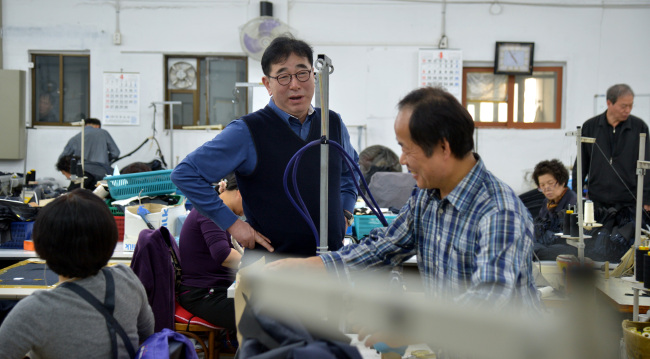As the machines hum in the background, drowning out the occasional chatter, workers cut fabric, sew and iron it at a suit factory in Guro-gu, western Seoul, a scene like any other manufacturing workshop in the industrial neighborhood. The difference here is that nearly half of the roughly 200 employees are disabled.
While the employment choice may be unconventional, the work efficiency of his company is similar to the competitors, the owner of the menswear manufacturer said in an interview with The Korea Herald.
“Those with disabilities do not use tricks and they work with honesty. That’s immediately reflected in the quality of the suits,” Kim Chang-hwan, CEO of suit manufacturer The Beautiful People said.
The company supplies menswear for several big companies and also sells its own custom-made business suit line.
As of this month, 89 out of 206 workers are disabled, with 70 percent having severe disabilities. Types vary from hearing loss and autism to linguistic, physical, intellectual and mental disabilities. They work in various divisions from suit production to human resource management and accounting.
 |
| The Beautiful People CEO Kim Chang-hwan (center) talks to one of his employees at a factory in eastern Seoul on April 10. (Kim Myung-sub/The Korea Herald) |
“Some think employees with mild disabilities will work better than those with severe problems but that is not the case at all,” the 58-year-old owner said. “The level of disabilities and the work capacity are irrelevant.”
The business has been flourishing consistently, recording 19 billion won ($ 17.6 million) in sales last year, compared to 7 billion won in 2010.
“There has never been a case where we failed to meet a deadline. On the contrary, the employees show better professionalism and expertise as they tend to change their jobs less often once they are employed,” the CEO said.
Kim has run the company since 1992 but it was not until 2002 that he considered hiring the disabled.
“To be honest, I didn’t think of recruiting the disabled with a philanthropic motive at first,” Kim said. “When I was having difficulties in recruiting nondisabled workers, I met a friend with a hearing disability. I thought it would be a good chance to offer him a job.”
Witnessing the efficiency of the friend, the CEO gradually expanded the number of employees with various types of disabilities.
Hiring them was not smooth at first. Some managers in charge of supervising the disabled workers expressed concerns over their abilities due to their lack of understanding. Kim was even forced to fire a manger after having a feud over the matter.
“As managers get to know how much the disabled work harder with diligence, they now ask me to employ more,” he said with a smile.
Having recognized his efforts for employing more and more people with disabilities, Kim won two awards including the Employment and Labor Minister Award in 2004. The Beautiful People was also designated an “exemplary company for disabled employment” by the government in 2010.
In order to get designated as an exemplary company, the owner needs to hire at least 30 percent of disabled workers for over seven years, with 50 percent of them having severe disabilities. The company should also ensure minimum wages and be equipped with disabled-friendly facilities.
As of last year, 174 companies were designated across the country, officials said.
One of Kim’s key principle in running the company has been to ensure a harmonious working environment.
He started to learn sign language for better communication, while holding a variety of events to foster a strong bond among workers.
Every spring, Kim and all his employees take an overnight trip to different parts of the country. Next month, they are heading to the coastal city of Yeosu in South Jeolla Province.
“I just would like to make my company a place where employees want to go to work every morning and work together,” Kim said, standing against the backdrop of a wall filled with photos taken by him during the memorable trips.
The CEO also sometimes rents a theater to watch a movie along with employees. He said he mostly chooses foreign films with subtitles for those with hearing disabilities.
“It’s not easy to work with the disabled unless you think of them with open-mindedness and sincerity, as you would your own children. I believe sincerity is what really matters,” Kim said.
By Lee Hyun-jeong (rene@heraldcorp.com)



